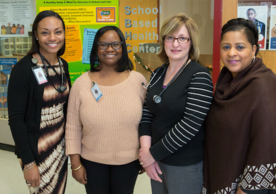
Alison Moriarty Daley ’94 MSN, PhD, APRN, PPCNP-BC, FAAN has been treating high school students for longer than most of them have been alive. Daley, a pediatric nurse practitioner and associate professor at Yale School of Nursing (YSN), spends three days a week at Hill Regional Career High School in New Haven, Connecticut, caring for students at the school-based health center (SBHC).
The services she and a handful of other health care professionals provide go beyond duties of a school nurse who would typically handle the public health of a school and vaccine compliance. The Career High School SBHC, now in its twentieth year, is a health clinic where high schoolers can receive primary care and behavioral health care.
Daley, along with Vanessa Reid ’05 MSN, DNP, APRN, CPNP, Maria Silva, LSCW, and Regina Felder, MS, an administrative associate, make up the team managing student health. The clinic can cover the whole picture of adolescent health, including mandatory physical exams for sports participation, STI and contraception education, and behavioral health counseling. All students, regardless of insurance, are eligible for care with a signed consent form from their guardian.
When Career High School was building new facilities, architects carved out space for the clinic, which is unique for SBHCs, according to Daley. Carla Giles, MPH, manager of Children’s Community Program and SBHCs for Yale New Haven Health, noted that the clinic is funded and staffed by Yale New Haven Hospital (YNHH) and supported by a partnership with the New Haven Board of Education. Giles added that “because YNHH has been operating SBHCs in the community since 1994, they are uniquely situated to bring health care professionals and educators together to address the multifaceted needs of children, youth, and families. They have had a profound impact on the lives of thousands of children in our community.”
Navigating Health Systems
Daley considers educating how to navigate one’s health care an essential part of what she does. The high school students learn how to use the health care system and how to be responsible for their health. “It’s something that you really need to practice over a long period of time in a safe environment,” Daley said of what she sees as an advantage of SBHC, “so that you not only get your health needs met, but you also can translate those skills to where you go next.”
YSN pediatric nurse practitioner (PNP) students can be precepted at the clinic. Katherine Lepere, a current PNP student in the class of 2021, appreciates providing care at the clinic because she did not have access to one as a high schooler. “Thinking back to when I was in high school,” she said, “it would have been really hard for me to get to a health care provider on my own.” At a key juncture in their development, Lepere believes teenagers should be empowered to speak up for themselves while navigating their health care. “Having a receptive, non-judgmental provider during adolescence is critical to fostering this attitude about health care,” Lepere said. “The younger we can start teaching kids to advocate for themselves, the better.”
A Rich History of School-Based Health Clinics
The first SBHC in Connecticut, called the Body Shop, opened at Wilbur Cross High School in New Haven in 1981. The concept of a school-based clinic began in the early 1970s when the role of school nurse was recognized as limited. A new kind of nurse practitioner with specialization in pediatrics emerged. Early clinics focused on family planning education and teen pregnancy prevention. In the 1980s, SBHCs proliferated due in large part to $40 million in funding the Robert Wood Johnson Foundation. The Body Shop benefitted from such funding and a collaboration between the Fair Haven Community Health Center and YNHH.
Daley said that the New Haven student experience is unique because “we have such a long, rich history of SBHCs. Many of these kids don’t know what it’s like to go to school without an SBHC.” This is thanks in large part to YNHH, which partners with and connects to eight SBHCs. “There’s a great link between the primary care center and specialties centers,” Daley said, “and we could follow up with any one of those.” The option provides ownership for these emerging adults to receive confidential care and avoid taking time off school to see a provider. The clinic is closed during the summer, but students, with or without insurance, can go to YNHH for care until school starts again.
For Lepere, working at the Career High School SBHC reminds her of the role she plays in shaping the students’ relationships with health systems. “For better or worse, their interactions with providers during this chapter of life have the potential to influence their health behavior for years to come,” she said. “It’s a tremendous responsibility to care for this population.”
Read full magazine here.
